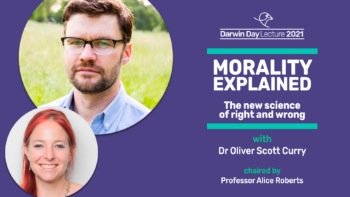Dr Oliver Scott Curry will deliver the Darwin Day Lecture 2021, taking place on 12 February 2021, Darwin Day itself. The event, a highlight of the humanist calendar, will take place fully online for the first time, and will be chaired by Humanists UK President Professor Alice Roberts.
This new science of right and wrong answers such questions as: How do ‘selfish genes’ make selfless people? Are there ‘genes for’ morality? When does morality emerge in children? How many moral values are there? Are there any universal moral rules, found in all cultures? How and why do individuals and societies have different moral values? And what does science tell us about how we ought to behave?
|
Curry argues that the answers to these questions show that Darwin was on the right track, when he wrote, in 1871’s Descent of Man, that ‘the so-called moral sense is originally derived from the social instincts, and that morality is deeply rooted in human nature, and part of our evolutionary heritage – a hopeful message in a year when we have relied on one another more than usual, to overcome the common challenge of covid.
Dr Oliver Scott Curry is Research Director for Kindlab, at kindness.org. He is also a Research Affiliate at the School of Anthropology and Museum Ethnography, University of Oxford, and a Research Associate at the Centre for Philosophy of Natural and Social Science, at the London School of Economics.
The Darwin Day Lecture 2021 will be held online, with a majority of the event devoted to questions from the audience – expected to be among the largest Darwin Day Lecture audiences to date. Tickets are available from humanists.uk/darwinday2021, priced at £7 per household.
Humanists UK Chief Executive Andrew Copson said,
‘Charles Darwin’s contributions demonstrated that we are all one human family, itself a tiny twig on the larger tree of life, and we celebrate Darwin Day each year to mark that revolutionary idea. We’re delighted to see demand for the Darwin Day Lecture as strong as ever, and look forward to welcoming thousands from around the world on 12 February.’
Notes
Tickets for the Darwin Day Lecture 2021 (Morality Explained: The New Science of Right and Wrong) with Dr Oliver Scott Curry, chaired by Professor Alice Roberts, are available to purchase at humanists.uk/darwinday2021.
About Dr Oliver Scott Curry
Oliver’s academic research investigates the nature, content and structure of human morality. He employs a range of techniques from philosophy, experimental and social psychology, and comparative anthropology. His work argues that morality is best understood as a collection of biological and cultural solutions to the problems of cooperation and conflict recurrent in human social life, and he will explore some of that work and the evidence for his ideas in the Darwin Day Lecture 2021.
In addition to his research, Oliver has taught courses on evolution and human behaviour, covering evolutionary theory, animal behaviour, evolutionary psychology, cross-cultural psychology, statistics and research methods.
About Professor Alice Roberts
Professor Alice Roberts has been President of Humanists UK since January 2019. She is Professor of Public Engagement in Science at the University of Birmingham, Director of Anatomy for the NHS Severn Deanery School of Surgery, and holds honorary fellowships at Hull, York Medical School, and the University of Bristol.
She is an honorary fellow of the British Science Association, a member of the Advisory Board of the Cheltenham Festival of Science, Patron of the Association of Science and Discovery Centres, and a member of the Council of the British Heart Foundation.
About the Darwin Day Lecture Series
The Darwin Day Lecture explores humanism and humanist thought as related to science and evolution, Charles Darwin, or his works. The Darwin medallist has made a significant contribution in one of these fields.
The lecture and medal are named and held to mark the annual global celebration of the birth of Charles Darwin, held every 12 February.
About Humanists UK
Humanists UK is the national charity working on behalf of non-religious people. Powered by 100,000 members and supporters, we advance free thinking and promote humanism to create a tolerant society where rational thinking and kindness prevail. We provide ceremonies, pastoral care, education, and support services benefitting over a million people every year and our campaigns advance humanist thinking on ethical issues, human rights, and equal treatment for all.

